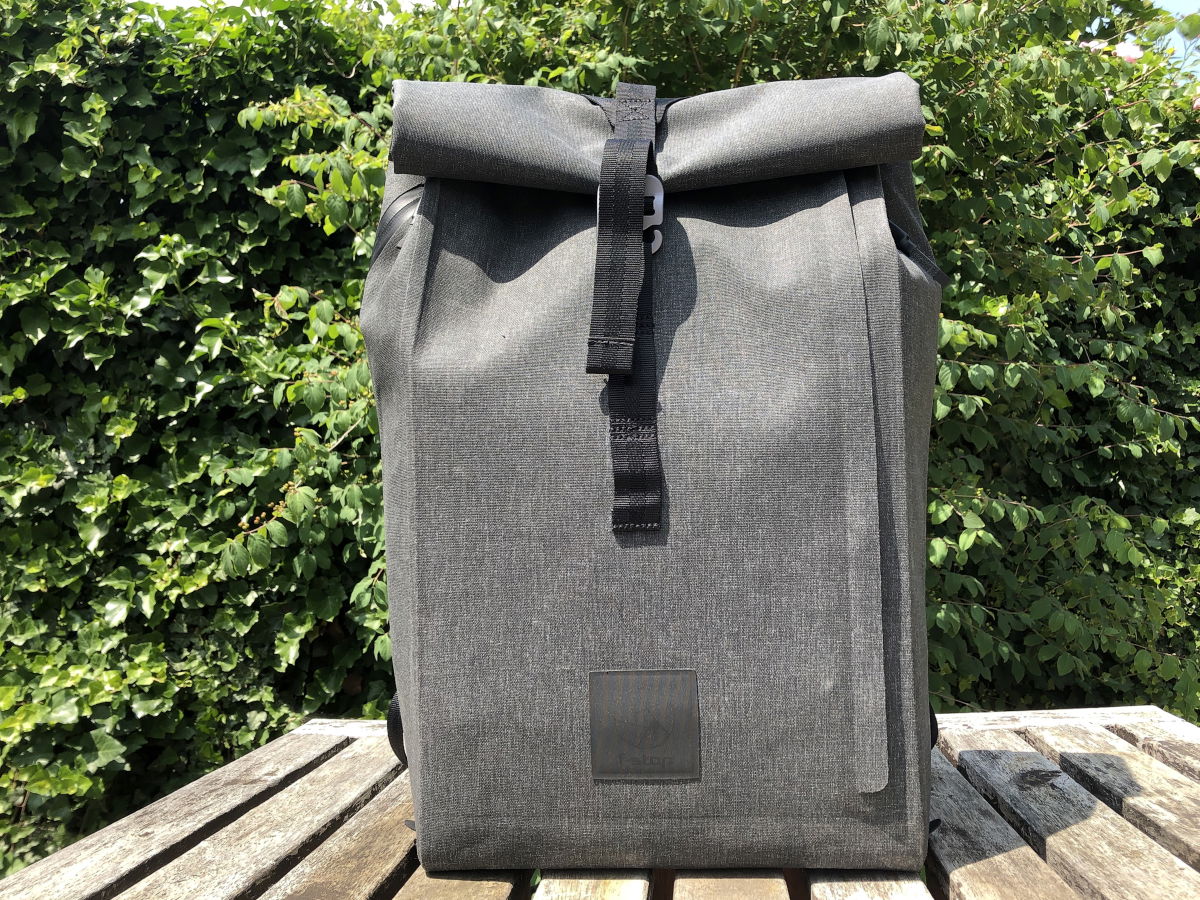There are so many lenses on the market that finding the best camera lenses for you can be tricky. You need a lens that’s compatible with your camera. And you need one that meets your photography needs. Sifting through the chaff to find the wheat is an arduous task.
But don’t worry. We’ve compiled a list of all the best lenses from all the major brands. We don’t have every great lens each brand has ever produced. There would be so many lenses on the list, it wouldn’t be helpful to anyone. But we’ve made a brief catalog of all the best new lenses from the major brands.
Our top pick as the best camera lens right now is the Canon RF 28mm f/2.8 STM. It gives you a lovely wide-angle view with sharp optical quality. It’s also super compact with a pancake design. And it’s an affordable lens for Canon’s mirrorless cameras.
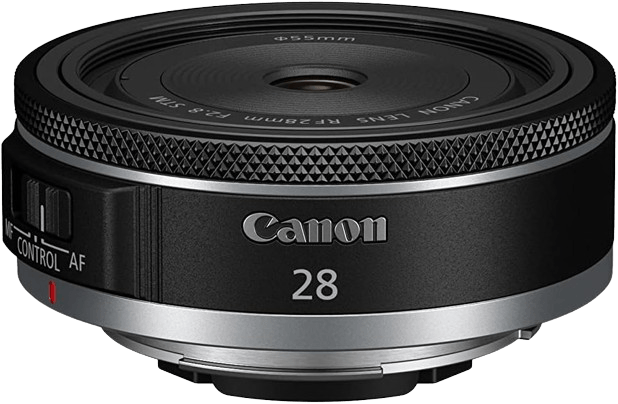
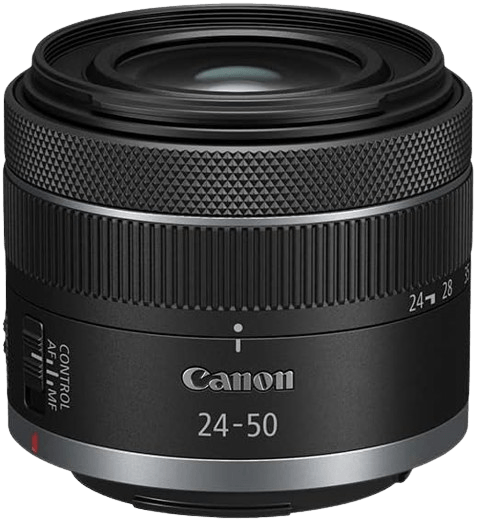
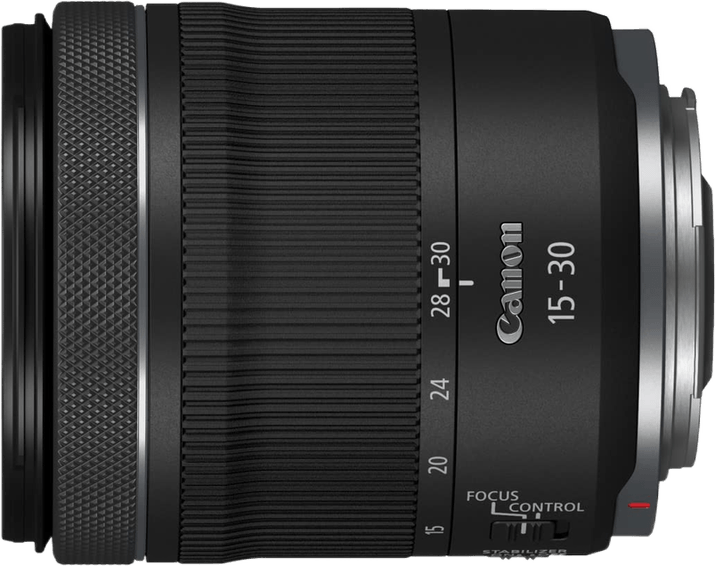
All the top brands are constantly producing new lenses for their cameras. And when technology advances so quickly, it can be hard to keep track.
In this article, we’re looking at the best camera lenses released in the last 18 months. There’s some fantastic glassware in the article. And we’ve broken the list down into sections so you can find exactly what you need.
We have new lenses from Canon and Nikon. We have the latest lens options from Panasonic, Olympus, and Fujifilm. And we have Sony lenses for their mirrorless cameras.
If the lenses in this article don’t hit the spot, we’ve included more articles about lenses throughout the post. With some simple navigation, you’ll have no trouble finding the best camera lenses that are exactly right for you.
Use the links below to jump to the specific section you want:
This section looks at all the best camera lenses from Canon. Canon is now fully dedicated to its mirrorless cameras. That means all their latest lenses are from the RF lens line. And these are compatible with Canon R-series cameras.
You can see an overview of the best Canon lenses in the table below. And we look at each lens in more detail below. If you want to see more RF lenses or the best EF lenses for DSLR cameras, use the following links.



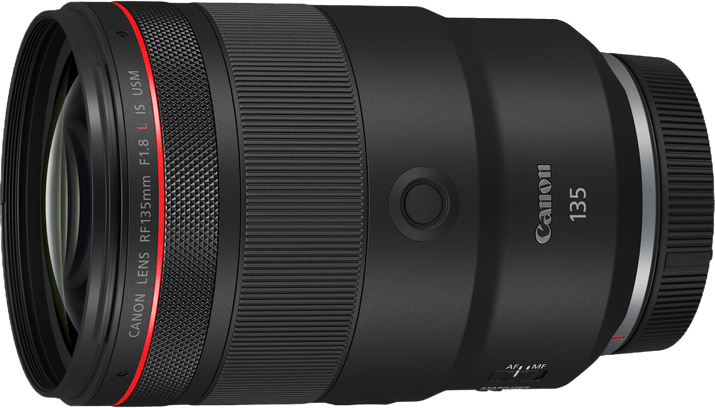

| Brand |
Brand
Canon
|
| Lens Mount |
Lens Mount
Canon RF
|
| Maximum Aperture |
Maximum Aperture
f/ 2.8
|
| Focal Length Range |
Focal Length Range
28 mm
|
| Image Stabilization |
Image Stabilization
|
| Weight |
Weight
0.49 lb / 224 g
|
| Key Features |
Key Features
Pancake design, Canon Super Spectra Coating, aspherical element
|
| Best For |
Best For
Canon users looking for a ultra-compact, wide-angle prime lens
|
The Canon RF 28mm f/2.8 STM is exactly what many Canon users have been calling for. It’s a super-compact pancake lens for Canon mirrorless cameras. It’s sharp, small, and affordable.
The 28mm focal length gives you a lovely wide field of view. You can use it for landscape photography. It’s great for architectural exteriors. And the small size helps street photographers keep a low profile. The convenient size also means travel photographers can throw it in their camera backpack without adding too much extra weight.
The optical quality is excellent for a pancake lens. Despite the small barrel, the lens has three aspherical elements. These reduce lens distortion. And Canon’s Super Spectra Coating (SSC) minimizes flare and ghosting.
Focusing isn’t a problem, even though the lens uses Canon’s older STM autofocus system. The STM system still works great in a small lens like this. It’s fast, reliable, and makes very little noise.
The Canon RF 28mm f/2.8 STM is a bargain despite being brand new. It’s an affordable lens beginners can get started with. But even experienced photographers will appreciate the quality of this prime lens.

| Brand |
Brand
Canon
|
| Lens Mount |
Lens Mount
Canon RF
|
| Maximum Aperture |
Maximum Aperture
f/ 6.3
|
| Focal Length Range |
Focal Length Range
24-50 mm
|
| Image Stabilization |
Image Stabilization
|
| Weight |
Weight
0.34 lb / 158 g
|
| Key Features |
Key Features
Image stabilization, Canon Super Spectra Coating, two aspherical elements
|
| Best For |
Best For
Canon mirrorless users who want an affordable standard-angle zoom lens
|
The Canon RF 24-50mm f/4.5-6.3 IS STM has a surprisingly low price. It’s a versatile zoom lens compatible with APS-C and full frame mirrorless cameras. And it has advanced features that give you stunning image quality. This will turn into a must-have lens over the coming months.
The 24-50mm focal length gives you excellent shot variety. Street photographers will love it. And the versatility makes it a great lens for real estate photography. You can shoot different-sized rooms without changing the lens. You can also use it for landscapes and portraits. All that makes it a fantastic travel lens too.
However, if you use this lens with an APS-C camera, you have to account for the crop factor. The effective focal length changes. That means this lens has a 38-80mm focal length with a crop sensor camera like the Canon EOS R100. It’s still a versatile lens. And it allows you to capture portraits with a tighter composition.
You don’t get the best exposure control with a max aperture of f/4.5 at the short end and f/6.3 at the long end. This does limit you in low light.
But to compensate, Canon has equipped the lens with optical image stabilization. This reduces signs of camera shake. And that allows you to shoot at slower shutter speeds with reduced risk of blur. This improves your exposure options in low-light situations.
The optical performance is strong for a zoom lens in this price category. With two aspherical elements, there’s very little chromatic aberration. And the Super Spectra Coating reduces lens flare.
The price alone makes this one to consider. But the Canon RF 24-50mm f/4.5-6.3 IS STM also has image stabilization, excellent optical quality, and a versatile zoom range. We’re sure this is going to be a popular Canon lens.

| Brand |
Brand
Canon
|
| Lens Mount |
Lens Mount
Canon RF
|
| Maximum Aperture |
Maximum Aperture
f/ 6.3
|
| Focal Length Range |
Focal Length Range
15-30 mm
|
| Image Stabilization |
Image Stabilization
|
| Weight |
Weight
0.86 lb / 391 g
|
| Key Features |
Key Features
Image stabilization, UD element, aspherical element, Canon Super Spectra Coating
|
| Best For |
Best For
Canon users who want an affordable wide-angle zoom lens
|
The Canon RF 15-30mm f/4.5-6.3 IS STM is another fabulous addition to the RF collection. It’s a wide-angle zoom with advanced features. And it also has an affordable price tag.
With a wide-angle focal range, you can use this lens for landscapes and cityscapes. And it’s a great option for real estate interiors or architecture photography.
The lens is compatible with full frame and APS-C cameras. But when used with an APS-C machine, the focal range is 24-48mm. That still gives you wide angles and good shot variety.
It delivers excellent optical quality throughout the zoom range. You might experience some distortion at the very edges. But the Ultra-low Dispersion (UD) and aspherical elements keep aberration to a minimum. Canon’s special coating on the outer glass also reduces flare and ghosting.
The max aperture of f/4.5-6.3 is disappointing. It limits your control over depth of field. But image stabilization helps you in low-light situations. You can use slower shutter speeds without the risk of blurry images.
The Canon RF 15-30mm f/4.5-6.3 IS STM is a classy lens at a reasonable price. It isn’t a pro-level lens. But you’re still getting a great deal with this wide-angle zoom.

| Brand |
Brand
Canon
|
| Lens Mount |
Lens Mount
Canon RF
|
| Maximum Aperture |
Maximum Aperture
f/ 1.8
|
| Focal Length Range |
Focal Length Range
135 mm
|
| Image Stabilization |
Image Stabilization
|
| Weight |
Weight
2.8 lb / 1.3 kg
|
| Key Features |
Key Features
UD elements, Air Sphere Coating (ASC), image stabilization
|
| Best For |
Best For
Canon users looking for a pro-level lens for portrait and product photography
|
The Canon RF 135mm f/1.8L IS USM is an example of Canon’s supreme optical engineering. It isn’t a budget lens. But it’s a sensational piece of kit that’ll take your portrait photography to new heights.
You get excellent telephoto magnification with a 135mm focal length. It’s perfect for close-composition portrait photography. And it’s an ideal lens for product and food photography.
Sharpness and clarity are exactly what this lens delivers. The barrel houses 17 pristine glass elements. And these include three Ultra-low Dispersion (UD) lenses that keep chromatic aberration to a minimum. The outer glass also has an Air Sphere Coating (ASC) to minimize glare and flare.
With a fast f/1.8 maximum aperture, you get excellent exposure control. It also allows you to achieve a shallow depth of field in your portraits. You’ll have a smooth and rich background bokeh effect.
If the f/1.8 aperture doesn’t give you enough exposure control, the lens also has built-in image stabilization. You can shoot in really dark conditions with great success.
This lens also uses Canon’s superior Ultrasonic Motor (USM) for the autofocus system. It’s incredibly quick and responsive. And it’s practically silent.
Availability is the main problem with the Canon RF 135mm f/1.8L IS USM. Canon hasn’t been able to produce enough units to meet demand. Many online retailers are often out of stock. But Canon is producing more, so you won’t have to wait long.
Now we’ll look at all the best lenses from Nikon. Like Canon, Nikon is now solely focused on their mirrorless camera line. That means all the newest Nikon lenses are compatible with their Z-series cameras.
You can see the latest Nikon Z lenses in the table below. Then we’ll look at each lens in more detail in the section below. If you want more info on a specific Nikon lens, follow these links.
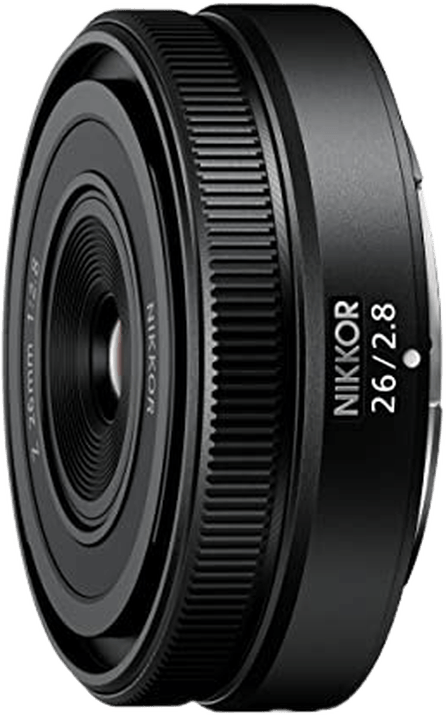
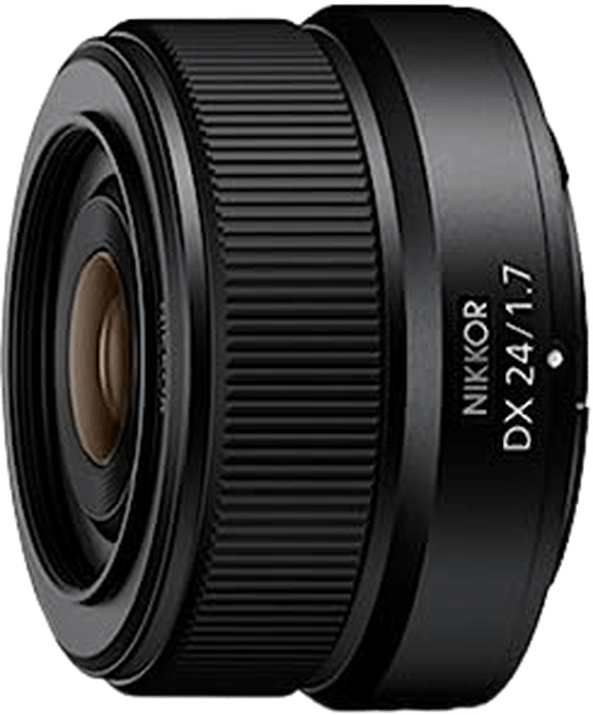
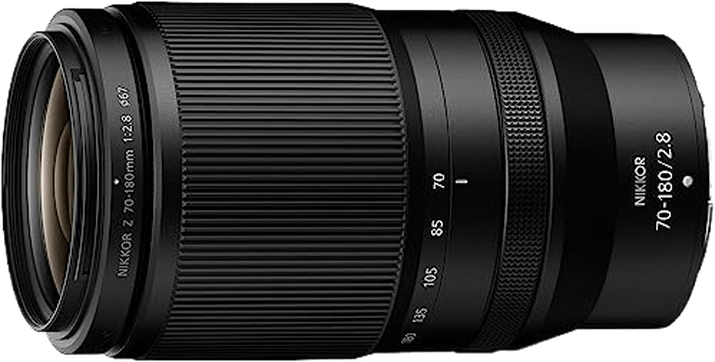
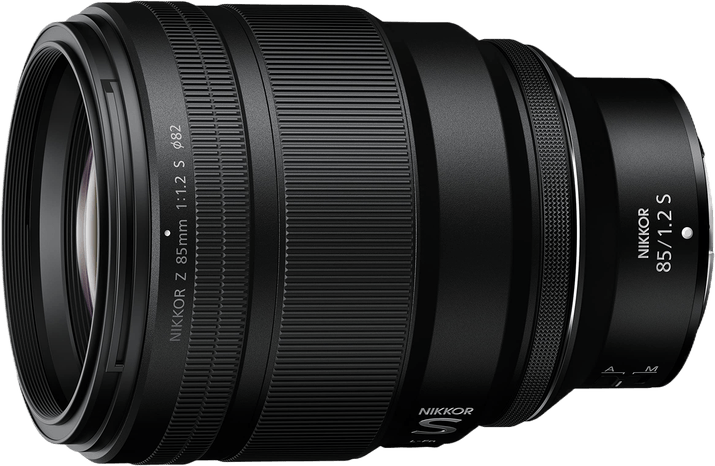

| Brand |
Brand
Nikon
|
| Lens Mount |
Lens Mount
Nikon Z
|
| Maximum Aperture |
Maximum Aperture
f/ 2.8
|
| Focal Length Range |
Focal Length Range
26 mm
|
| Image Stabilization |
Image Stabilization
|
| Weight |
Weight
0.28 lb / 127 g
|
| Key Features |
Key Features
All-element focusing, dust- and splash-resistant, custom control ring
|
| Best For |
Best For
Nikon users looking for a pancake prime lens
|
The Nikon Z 26mm f/2.8 is the perfect pancake lens for Nikon users. It’s compatible with full frame and APS-C Z cameras. It’s ultra-compact and lightweight. And it has been conditioned for outdoor shooting.
You get the advertised 26mm focal length when you use it with a full frame camera. But when you use it with an APS-C model, like the Nikon Z50, the effective focal length is 39mm. The field of view isn’t as wide, thanks to the crop factor. But it’s still a great lens for street photography.
All photographers will appreciate the fast f/2.8 aperture. It gives you excellent freedom with your exposure settings, allowing you to shoot in low-light situations.
The AF system is fast, smooth, and reliable. And the all-element focusing helps maintain the lens’ compact size. There’s very little expansion when you change focus. It’s a compact lens that stays compact.
You can use the lens’ control ring for manual focusing. But as a custom control ring, you can also set it to control other settings. It can adjust the aperture, ISO, or exposure compensation. It gives you an even more personal experience.
The Nikon Z 26mm f/2.8 is a robust lens for outdoor photography. It’s dust- and splash-resistant, so it can cope with a few drops of rain. That gives you all the more reason to invest in this sharp prime lens.

| Brand |
Brand
Nikon
|
| Lens Mount |
Lens Mount
Nikon Z
|
| Maximum Aperture |
Maximum Aperture
f/ 1.7
|
| Focal Length Range |
Focal Length Range
24 mm
|
| Image Stabilization |
Image Stabilization
|
| Weight |
Weight
0.71 lb/ 326 g
|
| Key Features |
Key Features
Dust- and splash-resistant, video-optimized AF
|
| Best For |
Best For
Nikon users with an APS-C mirrorless camera
|
The Nikon Z DX 24mm f/1.7 is a superb wide-angle lens for APS-C mirrorless cameras. It isn’t exactly a pancake lens. But it is very compact and lightweight. It won’t add much ballast to your travel camera. And it’s an affordable lens to add to your collection.
The 24mm focal length gives you a lovely wide-angle view. It’s great for capturing narrow European streets, shooting property exteriors, and landscape photography.
It’s also a great lens for video makers and vloggers. You can record yourself without having to position the camera miles away. And the autofocus is optimized for video recording. That means there’s no focus breathing or noise when you refocus during a take.
You have full creative control over your exposure settings. The fast f/1.7 aperture allows you to get a super-shallow depth of field. This gives you a lovely bokeh effect in your portraits or food photography shots. It also helps you shoot in low-light situations.
The Nikon Z DX 24mm f/1.7 makes a great travel option. And the fact it’s dust- and splash-resistant means you don’t have to worry about a bit of bad weather. It’s an affordable, versatile lens for photographers and vloggers.

| Brand |
Brand
Nikon
|
| Lens Mount |
Lens Mount
Nikon Z
|
| Maximum Aperture |
Maximum Aperture
f/ 2.8
|
| Focal Length Range |
Focal Length Range
70-180 mm
|
| Image Stabilization |
Image Stabilization
|
| Weight |
Weight
1.7 lb / 794 g
|
| Key Features |
Key Features
Optimized for video, 10.68 inch / 27 cm minimum focusing distance
|
| Best For |
Best For
Nikon users who want a versatile telephoto zoom lens
|
You’ll struggle to find a more versatile telephoto zoom than the Nikon Z 70-180mm f/2.8. It’s lightweight for a lens of this size. The optical quality is excellent. And you can use it to shoot a wide range of styles and genres.
The short end of the zoom range is great for portrait photography. The zoom gives you excellent flexibility when shooting. And the focal length allows you to get tight compositions for intimate portraits.
The other end of the zoom range gives you excellent magnification. You can get closer to your subject without moving your feet. It doesn’t have the reach of professional wildlife photography lenses. But it’s great for backyard bird photography. You can also use it for local sporting events.
When using the 70mm focal length, you get a 10.68 inch (27 cm) minimum focal distance. That allows you to capture stunning close-ups. It isn’t a true Nikon macro lens. But you can capture beautiful close-ups of flowers and insects. That also means it’s a great choice for product photography.
There’s no focusing breathing when you refocus while recording video. And the stepping motor is so quiet, microphones won’t pick it up. That’s why filmmakers can also use this lens with great success.
The fast aperture is another top selling point for this lens. The f/2.8 max aperture is fast enough for low-light shooting. And you can get a fabulous bokeh. But one major positive is the aperture stays constant throughout the entire zoom range. You don’t lose any aperture stops when you zoom in.
The Nikon Z 70-180mm f/2.8 has a very reasonable price tag for the lens you get. It’s versatile and streamlined for the modern multimedia creator. It’s a lens you’ve simply got to try.

| Brand |
Brand
Nikon
|
| Lens Mount |
Lens Mount
Nikon Z
|
| Maximum Aperture |
Maximum Aperture
f/ 1.2
|
| Focal Length Range |
Focal Length Range
85 mm
|
| Image Stabilization |
Image Stabilization
|
| Weight |
Weight
2.5 lb / 1.1 kg
|
| Key Features |
Key Features
11-blade aperture, nano crystal coating, ED and aspherical elements
|
| Best For |
Best For
Professional portrait photography
|
The Nikon Z 85mm f/1.2 S is an incredible lens for professional portrait photography. It isn’t a budget lens by any standards. But it’s one of Nikon’s best lenses in their Z or F ranges.
The 85mm focal length is perfect for portrait photography. It allows you to create intimate compositions without invading your subject’s personal space. And it’s still wide enough to photograph couples and groups. That’s ideal for wedding photography.
The optical quality is sensational. It gives you razor-sharp images with no distortion, even at the outer edges. Each element has been crafted with precision and care. And the barrel includes Extra-low Dispersion (ED) and aspherical elements. These completely eliminate chromatic aberration.
Picture quality is improved further by the anti-reflective Nano Crystal Coating (NCC) on the glass. It controls light dispersion, reducing ghosting and lens flare. This allows you to shoot in harsher lighting conditions with better results.
We can’t ignore the superfast f/1.2 aperture. The low-light performance is excellent. But it also allows you to get a paper-thin depth of field. And the 11-blade round aperture gives you the smoothest bokeh you can imagine.
The L-Fn function button on the barrel gives you more hands-on control. You can assign custom controls to it, like subject tracking or AF lock. You get more focusing control without having to change the settings in the camera.
There’s no doubt the Nikon Z 85mm f/1.2 S is one of Nikon’s finest portrait lenses. And we mean the best ever. You need a healthy budget for this one. But it’s a worthy investment for professional portrait photographers.
Sony’s main focus at this time is its full frame mirrorless cameras. They do have a good selection of lenses for their APS-C cameras. But all of Sony’s latest lenses have been FE lenses, which are compatible with full frame cameras.
Check out the quick rundown in the product table before our deeper dive into each lens below. If you can’t find the lens you need, check out some of these Sony lens articles.
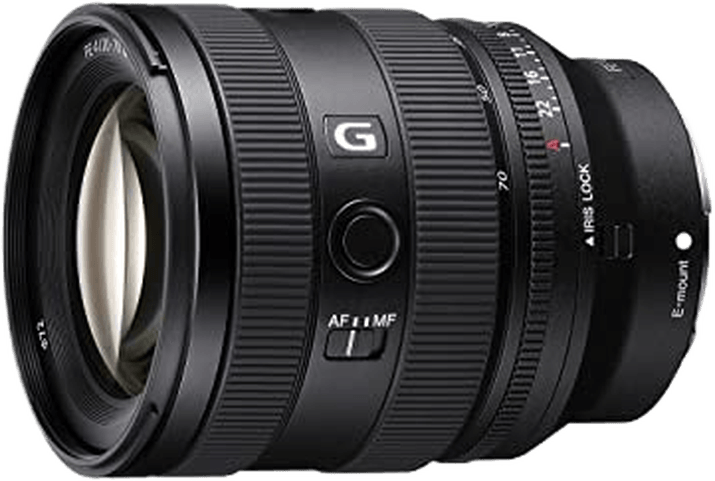
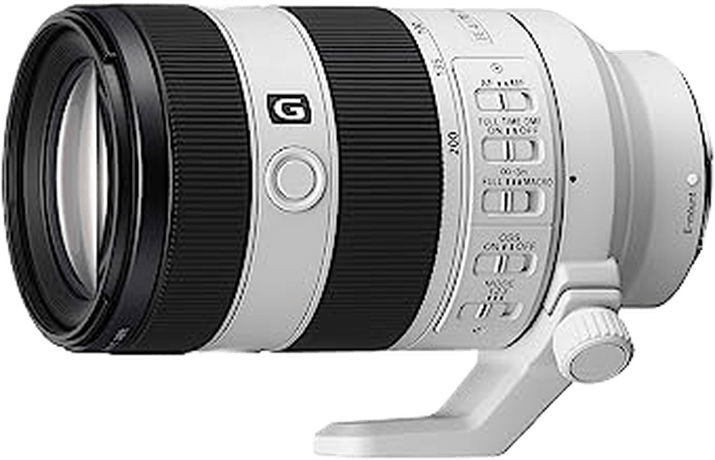
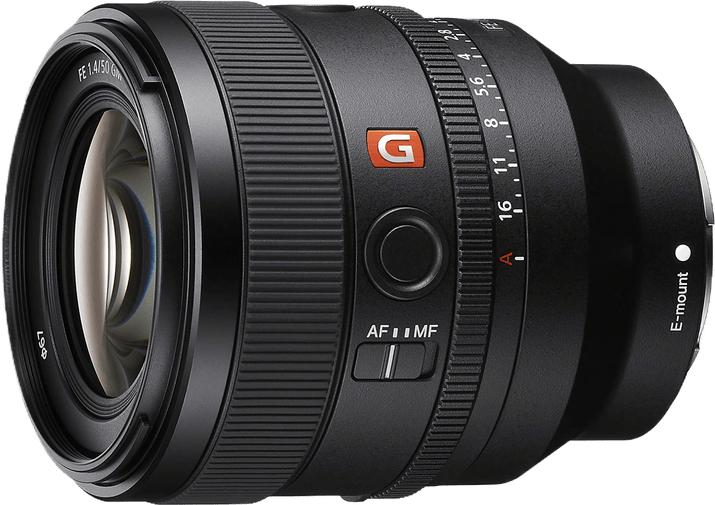

| Brand |
Brand
Sony
|
| Lens Mount |
Lens Mount
Sony E
|
| Maximum Aperture |
Maximum Aperture
f/ 4.0
|
| Focal Length Range |
Focal Length Range
20-70 mm
|
| Image Stabilization |
Image Stabilization
|
| Weight |
Weight
1.08 lb / 490 g
|
| Key Features |
Key Features
Two XD AF motors, video-optimized focus, AA lens element, focus-hold button, manual aperture ring
|
| Best For |
Best For
Sony users who need a versatile standard-angle zoom lens
|
The Sony FE 20-70mm f/4 G is a handy addition to any Sony lens collection. As an FE lens, it’s compatible with Sony’s full frame mirrorless cameras. It has crisp optical quality. And it has advanced features that give your photos a boost.
With a 20-70mm zoom range, you get a wonderfully wide shot variety. The 20mm end allows you to capture broad landscapes and architectural exteriors. The middle range is perfect for street photography. And you can shoot intimate portraits with the 70mm end.
That versatility makes it a great option for travel photography. And it’s fairly compact and lightweight. But the versatility means you don’t need to pack many other lenses in your travel backpack. This is an all-in-one solution for travel photography.
The f/4 max aperture isn’t the fastest. But it still gives you good control over your exposure settings. And you can still get a fabulous bokeh background thanks to the 9-blade circular aperture diaphragm.
Chromatic aberration can be a problem with zoom lenses. But that’s not the case here. This lens has both Extra-low Dispersion (ED) and Advanced Aspherical (AA) elements that combat that very problem. The results are sharp, distortion-free images.
The autofocus is another top selling point. It’s driven by two Extreme Dynamic (XD) linear motors. And that means the AF is super-responsive and smooth. There’s practically no focus breathing, and it’s close to silent. That’s good news for videographers.
The Sony FE 20-70mm f/4 G is perfect for photographers who like hands-on control. It has a manual aperture ring, just like 35mm film cameras. And there are iris-lock and focus-hold buttons on the barrel. It’s a truly interactive lens creative photographers will love.

| Brand |
Brand
Sony
|
| Lens Mount |
Lens Mount
Sony E
|
| Maximum Aperture |
Maximum Aperture
f/ 4.0
|
| Focal Length Range |
Focal Length Range
70-200 mm
|
| Image Stabilization |
Image Stabilization
|
| Weight |
Weight
1.7 lb / 794 g
|
| Key Features |
Key Features
Aspherical, ED, and super ED elements, Optical Steady Shot, EX AF motor
|
| Best For |
Best For
Sony users who need a high-quality yet affordable telephoto zoom
|
The Sony FE 70-200mm f/4 Macro G OSS II is the perfect blend of performance and value. It isn’t exactly cheap. But considering the build quality and features, it offers great value for money.
The 70-200mm lens is one of the most popular lens types in photography. That’s because they offer excellent versatility. You can use them for anything from portraiture to sports photography. And this Sony lens is no different.
There are no doubts about the optical quality. The lens barrel contains both aspherical and Advanced Aspherical (AA) elements. You also have three Extra-low Dispersion (ED) elements. And that’s backed up by one Super ED element. The result is crystal-clear picture quality throughout the entire zoom range.
You don’t have the fastest max aperture at f/4. But that is constant throughout the focal range. You don’t lose any stops when zooming in. And the lens’ 9-blade rounded aperture still gives you a smooth bokeh.
Sony has also compensated for the slow-ish aperture with their Optical Steady Shot (OSS) stabilization system. It reduces the signs of camera shake, allowing you to work with slower shutter speeds. It gives you better results in low-light situations.
Driven by a high-thrust Extreme Dynamic (XD) linear motor, the autofocus is fast, smooth, and quiet. It also employs a floating focus group system, which helps it achieve fast focusing speeds.
The Sony FE 70-200mm f/4 Macro G OSS II isn’t a true macro lens. But when you attach the Sony 2.0x teleconverter, it gives you the lifesize 1:1 ratio of a macro lens. That’s great news for macro photographers.

| Brand |
Brand
Sony
|
| Maximum Aperture |
Maximum Aperture
f/ 1.4
|
| Focal Length Range |
Focal Length Range
50 mm
|
| Image Stabilization |
Image Stabilization
|
| Weight |
Weight
1.1 lb / 517 g
|
| Key Features |
Key Features
11-blade aperture, ED element, XA element, Nano AR coating
|
| Best For |
Best For
Professional photographers looking for an ultra-sharp 50mm prime lens
|
50mm prime lenses are some of the most popular in photography. But you won’t find many with better optics than the Sony FE 50mm f/1.4 GM. It’s a professional-grade prime lens. And it has advanced features experienced photographers will appreciate.
The optical quality is sensational. You get razor-sharp pictures from corner to corner. That’s thanks to the quality of the glass within the lens. There’s an Extra-low Dispersion (ED) element. And there’s an Extreme Aspherical (lens). This corrects chromatic aberration and other types of distortion for perfect clarity.
And with the Nikon Nano AR coating, you also get reduced flare, glare, and ghosting. There aren’t many 50mm lenses that can compete with this Sony masterpiece.
Low-light performance is another strength. The fast f/1.4 aperture allows you to work with less light. And you can achieve an ultra-shallow depth of field.
The lens also gives you even better bokeh thanks to its 11-blade diaphragm. Even other lenses at this level only have 7- or 9-blade apertures. But using 11 blades gives you a perfectly circular aperture. And this gives you the smoothest bokeh imaginable.
Like the previous Sony lenses, this prime has the Extreme Dynamic (XD) motor driving the autofocus. It’s accurate and quick. And it’s practically silent in operation.
The Sony FE 50mm f/1.4 GM is a superb piece of equipment. Most photographers won’t have the budget for this 50mm prime. But professionals will appreciate the quality and know it’s worth the price.
These camera brands don’t have the same level of output as the previous ones we’ve looked at. They have fewer cameras on the market. And that means they don’t release as many lenses. That’s why we’ve grouped them together in this section.
Keep reading for more information on the latest lenses from Fujifilm, Olympus, and Panasonic. You can also click on the links below if you can’t find what you need here.
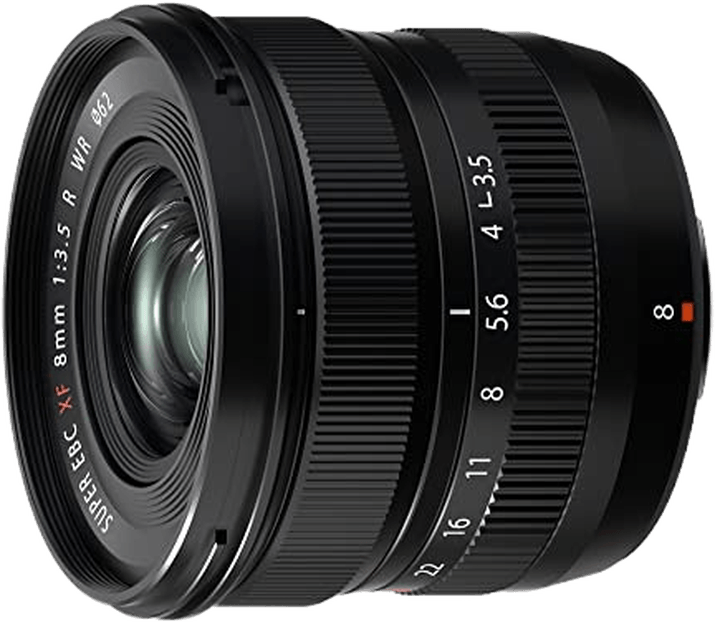
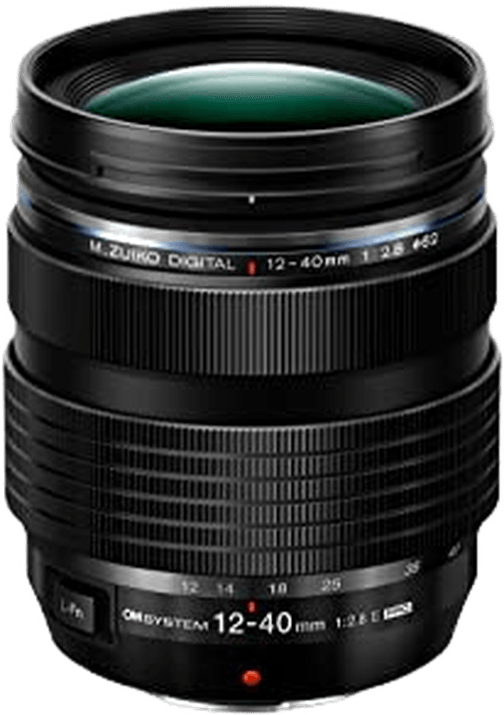
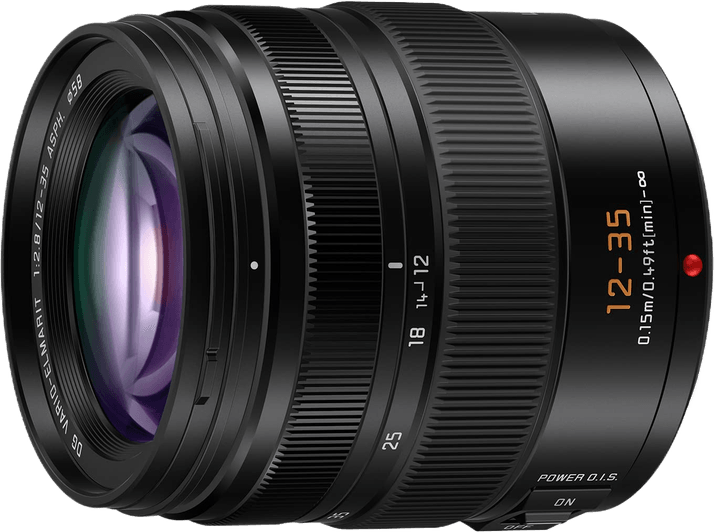
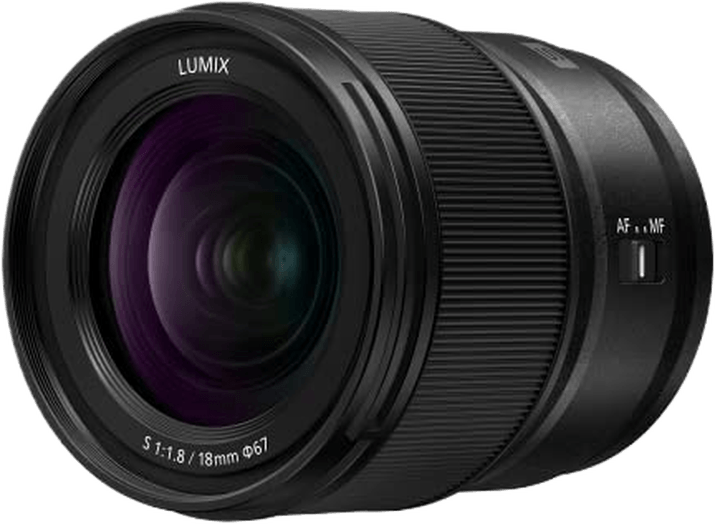

| Brand |
Brand
Fujifilm
|
| Lens Mount |
Lens Mount
Fujifilm X
|
| Maximum Aperture |
Maximum Aperture
f/ 3.5
|
| Focal Length Range |
Focal Length Range
8 mm
|
| Image Stabilization |
Image Stabilization
|
| Weight |
Weight
0.47 lb / 215 g
|
| Key Features |
Key Features
Weather-resistant construction, two ED elements, three aspherical elements
|
| Best For |
Best For
Fujifilm users looking for a high-grade wide-angle lens
|
The Fujifilm XF 8mm F3.5 R WR is a beautiful wide-angle lens for Fujifilm’s X-series mirrorless cameras. It’s compact and lightweight. But the optical quality is professional standard.
The lens has an 8mm focal length, but this is equivalent to 12mm on a full frame camera. That means you still get an incredibly wide viewing angle. In fact, it gives you a 120-degree field of view.
With such a wide angle, you can shoot epic landscapes. Or you can capture cityscapes in urban areas. And it’s great for shooting large architectural structures. You can also use it for video recording. And the wide angle makes vlogging easy.
Despite the small size and light weight, the lens is packed with quality glass. There are two Extra-low Dispersion (ED) and three aspherical elements. And these reduce distortion to an absolute minimum. The elements also have a rectilinear design, which helps straight lines stay straight even at the very edges.
A max aperture of f/3.5 isn’t the fastest. But the new Fujifilm cameras have built-in image stabilization to compensate. It also has a fast and reliable AF motor. And the lack of focus breathing means it’s optimized for video production.
The Fujifilm XF 8mm F3.5 R WR is also a robust lens with weather-resistant protection. You can use it outdoors without worrying about a few drops of rain. It also has a surprisingly low price tag. It isn’t packed with features, but the quality is fantastic.

| Brand |
Brand
Olympus
|
| Maximum Aperture |
Maximum Aperture
f/ 2.8
|
| Focal Length Range |
Focal Length Range
12-40 mm
|
| Image Stabilization |
Image Stabilization
|
| Weight |
Weight
0.8 lb / 380 g
|
| Key Features |
Key Features
Weather sealed, fluorine coating, manual focus clutch
|
| Best For |
Best For
Photographers with a Micro Four Thirds camera
|
The Olympus ED 12-40mm f/2.8 PRO II is a fantastic new lens from Olympus. Olympus now goes by the name OM Systems, but there has been no change in the quality of their lenses. And this is a versatile zoom lens with a sensational build quality.
The focal length is 12-40mm. But on a Micro Four Thirds camera, the effective focal length is actually 24-80mm. That is a wide-angle to telephoto range of views, making it an incredibly versatile lens.
The construction is fantastic. The premium glass engineering gives you crisp and clear images with corner-to-corner sharpness. The fluorine coating also reduces lens flare. And the lens is completely weather sealed for outdoor shooting.
You can focus quickly and with no noticeable focus breathing. And the barrel has a manual focus clutch. That means you can override the AF system and focus manually at any time. There’s also an L-Fn function button for custom settings.
One of the great things about Micro Four Thirds cameras is that they all have the same lens mount. Whether it’s an Olympus or Panasonic camera, you can use the same lenses. That means you can use an Olympus lens with a Panasonic camera and vice versa. You have new freedom to mix and match.

| Brand |
Brand
Panasonic
|
| Maximum Aperture |
Maximum Aperture
f/ 2.8
|
| Focal Length Range |
Focal Length Range
12-35 mm
|
| Image Stabilization |
Image Stabilization
|
| Weight |
Weight
0.67 lb / 306 g
|
| Key Features |
Key Features
Image stabilization, dust- and splash-resistant, nano coating
|
| Best For |
Best For
Panasonic photographers and filmmakers
|
The Panasonic Lumix G 12-35mm f/2.8 OIS is a pro-level zoom lens at a reasonable price. Constructed in a partnership with Leica, you’ll struggle to find fault with the quality. And it has excellent features for photographers and videographers.
As a Micro Four Third (MFT) lens, the equivalent focal length is 24-70mm on a full frame camera. It’s a great option for street and travel photography. But you can also capture portraits with a tight composition. The wide-angle end also allows you to shoot vast landscape photography shots.
With a fast f/2.8 aperture, you get excellent low-light performance. It also allows you to use a shallow depth of field. But you get even more control with Optical Image Stabilization (OIS). It reduces signs of camera shake, so you can shoot with slower shutter speeds.
The picture quality is excellent. You get sharp images at any point in the focal range. And the nano surface coating on the outer elements prevents ghosting and flare.
There’s no focus breathing when changing focus during a video shot. And the fast AF motor can work with frame rates up to and including 240 fps. That means you can use it for super-slow-motion footage as well as movies and vlogs.
The dust- and splash-resistance make the Panasonic Lumix G 12-35mm f/2.8 OIS a tough lens. And because it is an MFT lens, you can use it on Panasonic or Olympus MFT cameras.

| Brand |
Brand
Panasonic LUMIX
|
| Lens Mount |
Lens Mount
Leica L
|
| Maximum Aperture |
Maximum Aperture
f/ 1.8
|
| Focal Length Range |
Focal Length Range
18 mm
|
| Image Stabilization |
Image Stabilization
|
| Weight |
Weight
0.74 lb / 340 g
|
| Key Features |
Key Features
Splash-, dust-, and freeze-resistant, 3 aspherical elements
|
| Best For |
Best For
Panasonic Lumix S-series cameras
|
The Panasonic Lumix S 18mm f/1.8 is a simple yet elegant Panasonic lens. With the L-mount, it’s compatible with Panasonic S-series full frame cameras. And it’s optimized for photography and video production.
The 18mm focal length gives you a beautifully wide angle. But it’s sharp from edge to edge. You don’t get any distortion or warping at the sides or corners. And as a full frame lens, you get a true 18mm focal length.
The sensational sharpness comes down to the quality of the glass elements. There’s a total of 13 elements in the barrel. And these include aspherical, Extra-low Dispersion (ED), and Ultra-low Dispersion (UD) elements. These work together to remove all types of distortion and aberration.
You get wonderful low-light performance with the f/1.8 aperture. And it allows you to get a smooth bokeh effect when using a shallow depth of field.
Panasonic cameras are famous for their video features. And thankfully, their lenses are up to the job of recording video. There’s no focus breathing. And the lens has a smooth, clickless aperture, so there’s no sound when you change that setting.
The Panasonic Lumix S 18mm f/1.8 is also a durable prime lens. It’s dustproof for dry conditions and splashproof for wet weather. And it’s even freezeproof, so you can use it in below-freezing temperatures.
Keeping up to date with the best camera lenses isn’t easy. Brands like Canon, Nikon, and Sony are always releasing amazing new lenses. Then you also have other manufacturers popping up with a new lens or two. It can often put your head in a spin.
We’ve kept up with all the latest lenses, so you don’t have to. And we believe the Canon RF 28mm f/2.8 STM is the best camera lens right now. It’s a reliable wide-angle lens for Canon’s R-series cameras. And it’s an affordable lens for photographers with a tight budget.



